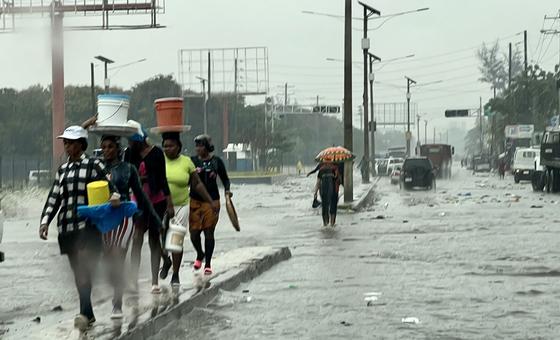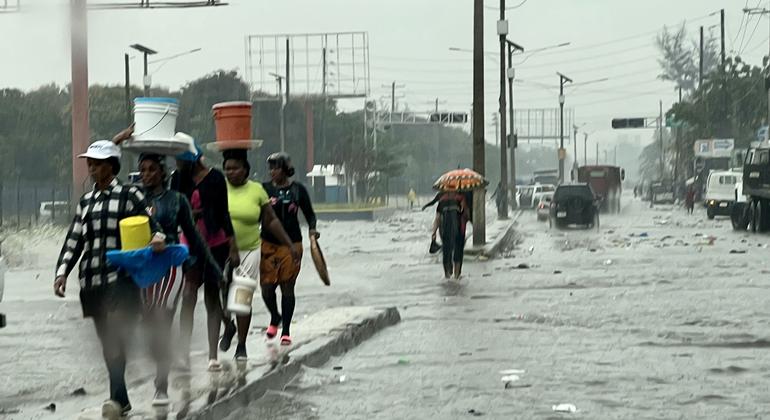
Dennis Francis, a veteran diplomat from Trinidad and Tobago, said he had returned from a visit to Haiti at the end of last month “with hope and the full knowledge that while Haiti is facing extraordinary challenges, its future holds indomitable promise.”
The country has seen almost 4,000 killed and 3,000 kidnapped in gang-related violence just this year, following a political, economic and security crisis that has left much of the country descend into lawlessness.
Driving in the streets of Port au Prince, I saw visible signs of hope – sustained by the undying resilience and perseverance of the Haitian people – who seem to create inventive ways to meet the daily challenges”, Mr. Francis told the meeting.
‘No shortage of potential’
“There is, in my view, no shortage of potential in Haiti – and it is not too late that, as the international community, we must do something to accompany the Haitian people, further”, he said noting that the most pressing need is for greater security.
“Uncontrollable violence has robbed and continues to rob the Haitian people of their freedoms and rights; and it is stifling the country’s path to sustainable development”, he said.
Around 40 per cent of Haiti’s healthcare workers have reportedly left the country, while women and girls have been subject to brutal sexual violence “with many living in a cycle of fear and trauma.”
Credibility at stake
He said “we cannot be credible, as the UN and the international community, to just look the other way.”
Mr. Francis noted that the much-needed deployment of a Multinational Security Support Mission authorized by the Security Council on 2 October, has not materialised.
It is “awaited with great urgency by many in Haiti”, with 80 per cent of the capital under gang control and spreading further afield into rural areas, he said.
He expressed “deepest thanks” to Kenya for “demonstrating leadership of this critical mission”, as well as all other countries that have pledged or are planning to contribute.
According to news reports, despite political and legal setbacks the first group of Kenyan officers are due to be deployed early next year.
“I encouraged the authorities, as well as representatives of Haiti’s political parties and civil society representatives, to surmount their differences – emphasizing that every stakeholder has a duty to work for the interests of the country and the people.”
He called on political elites in Haiti to abandon their self-centred pre-occupation and to prioritize their constituents “who have endured too much turmoil and who deserve to be given a chance, to succeed. I emphasized that Haiti belongs to them too and that it is their responsibility as elites seeking office to fix the country so that young Haitians would be guaranteed a life chance.”
Stand with the people: ECOSOC president
The President of ECOSOC, Paula Narváez said that as the principal bodies of the UN met with a call for collective action, they needed to send “a strong signal that we firmly stand with the Haitian people.”
She said that while Haiti had to take a lead, a “holistic approach” is needed for the long-term, including the support of Haitian civil society, women and youth.
“Saving Haitian lives must be out utmost priority said Ms. Narváez, calling on all partners to substantially increase their support for the Haiti Humanitarian Response Plan which as of last week, is only 33 per cent funded.
Secondly, efforts must be focused on long-term resilience through sustainable development. This means strengthening institutions, initiating justice and rule of law reforms and gender equality led through women’s empowerment.
Third she called for implementation of the UN Sustainable Development Cooperation Framework, a four year plan setting out priorities and a clear pathway forward.
Also is support for Haitian youth who are 60 per cent of the population and mobilizing private sector and civil society investments.
She said ECOSOC is “dedicated to finding solutions to enable long-term stability” and address the root causes of crises afflicting Haiti.
Redouble support
The ECOSOC Advisory Group on Haiti on Monday called on international financial institutions to “redouble” their assistance to the country.
In a statement the group continued to “stress the importance of coordination and coherence among partners and meaningful engagement of and ownership by Haitians.
The Advisory Group welcomes the close collaboration between international financial institutions and United Nations entities. It also encourages continued dialogue between the UN and regional organizations.



